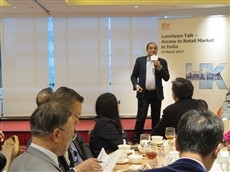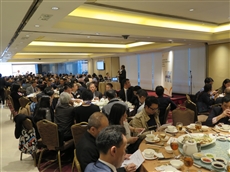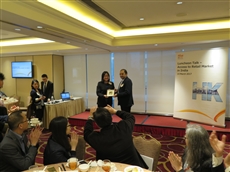Huge Opportunities For Business Collaboration Between India and Hong Kong
21 March 2017 – India is often regarded as the new land of business opportunity. More than 140 business people attended a seminar on “Access to Retail Market in India” with speaker Rakesh Biyani, the Joint Managing Director of Future Retail Ltd. & co-founder of Future Group. The seminar was organised by the Hong Kong Trade Development Council (HKTDC) on 14 March, to learn more about India’s retail market and related business opportunities and challenges.
Huge growth potential
Mr Biyani, whose family founded Future Group 25 years ago, said the company is now one of the largest retail groups in India, with 5,200 retail outlets including department stores and specialty stores in more than 240 cities, covering consumer goods including food, fashion and cosmetics. The Group reported a turnover of US$3.4 billion in 2016 and expects this to reach US$15 billion in the next five years.
Hong Kong + India = Ideal partnership
Mr Biyani projects the amount of value-added products the company will import in the next five years will rise by nearly 200 per cent. “We have set a target to grow to $15 billion from $3.4 billion in this next 5 years because we cater to this customer base (aspirational). That’s where the larger opportunity is.”
And he see’s Hong Kong as the ideal business partner for his company to achieve its goals, as well as for retail companies across India.
“Hong Kong typically tends to be trendier and more quality-oriented,” he said. “Hong Kong now is really the place for sourcing entry level, good priced products in the better and best category, that’s where Hong Kong has the opportunity and we are now very keen to expand our share of those products. And we think we can work with Hong Kong manufacturers.”
As for the top trading categories for his company, Mr Biyani identified fashion, food and home decoration. “Clearly in fashion footwear and accessory, there’s a lot we can work together with designers and companies out here (Hong Kong) and look at how to get the latest trend, cut the lead time around that and take it back to India.”
In terms of home improvement and decoration, he said that Hong Kong had much in common with cities in India, with people in both places living in smaller homes.
“When it comes to home in the next four to five years, we’re going to see a lot of demand in terms of more consumers are going to be decorating their homes and making them trendier. So Hong Kong manufacturers understand the art of using small space in the most optimum manner. And some of that product knowledge can go back to some of the urban cities of India.”
Consumers looking for greater choice and quality
“India is the fastest growth economy in the world,” said Mr Biyani, adding that the population of influential consumers will grow to between 350 million and 400 million by 2020, which is similar to the entire population of the United States. “There are lots of people in India who are looking for differentiated products. Meanwhile, there’re more than 30 million retail stores in India, which is about one store for every 100 people. This is where the challenges come from,” he pointed out. “The retail market has been changing.”
Mr Biyani noted that the affluent consumers are shifting from daily necessities to fashion, accessories, beauty and electronic products. With higher disposable income of the affluent consumers, they look for quality products but also competitive and affordable prices.
“There’re lots of changes happening here, particularly for the mobile penetration while Indians are getting exposure to the world. No one is living in a small town now but in the Internet world.” Indians are socially connected and they are used to social media platforms such as Facebook and WhatsApp, he stressed.
E-commerce generation creates opportunities
According to Mr Biyani, India has the fastest-growing number of Internet users, close to 460 million currently. Besides, the country has the world’s cheapest mobile data service plan, only one-third of the US and half of China’s. “We have large young population, now 60 per cent of the population is under 40 and the average age will be 29 in 2020,” he said, implying that the potential growth for e-commerce and online shopping is tremendous.
Regarding the sourcing practice of Indian buyers, Mr Biyani said that companies like the Future Group prefer working with suppliers and vendors from Hong Kong because of the high quality and cost effectiveness. “Hong Kong is treated as a sourcing hub and companies like us always come to the trade fairs in Hong Kong to source vendors and suppliers.”
He noted that Indian consumers demand value, not necessarily the cheapest, but the best value.
Indian tax reform expected to generate more competition
Mr Biyani also pointed to the fact that the Indian government is reforming the tax regime, which is expected to bring about more competition among local and imported brands.
At the same time, he said that retail space in India was expanding rapidly. “Currently we have close to 20 million square feet of retail space in operation in India. And we’re looking at expanding our network about 14-15 per cent per annum. So that’s adding about another two to three million square feet of new retail space every year.”
Recognising the cultural diversity in India is key to doing business in India, according to Mr Biyani. He made this explicit when he asked for a glass of water in the middle of his presentation and the waiter presented him a glass of hot water. “We are never served hot water in restaurants in India, but only room-temperature water," he explained.
To highlight the importance of cost determination in India, he offered the example of ordering a fruit juice, saying that, unlike other places, iced juice is cheaper in India as it gets diluted with water. But if you order juice without ice, it is 100 per cent juice, and hence it is more costly. "One has to keep these issues in mind when doing business in India, which are the real challenges,” he concluded.
|
|
Retailing Guru Rakesh Biyani identifies keys to successful partnership building between Hong Kong and India during a seminar organised by the Hong Kong Trade Development Council in Hong Kong on 14 March
|
|
|
Over 140 business people attend the seminar on “Access to Retail Market in India” with speaker Rakesh Biyani, Joint Managing Director of Future Retail Ltd. & co-founder of Future Group |
|
|
Regina Lai, Director of Product Promotion, HKTDC presents Rakesh Biyani with a memento following his insightful presentation to the Hong Kong business community on 14 March |
Media Enquiries
Please contact the HKTDC's Communication and Public Affairs Department:
Joe Kainz Tel: (852) 2584 4216 Email: joe.kainz@hktdc.org
To view press releases in Chinese, please visit http://mediaroom.hktdc.com/tc
About the HKTDC
Established in 1966, the Hong Kong Trade Development Council (HKTDC) is a statutory body dedicated to creating opportunities for Hong Kong’s businesses. With more than 40 offices globally, including 13 on the Chinese mainland, the HKTDC promotes Hong Kong as a platform for doing business with China, Asia and the world. With 50 years of experience, the HKTDC organises international exhibitions, conferences and business missions to provide companies, particularly SMEs, with business opportunities on the mainland and in international markets, while providing information via trade publications, research reports and digital channels including the media room. For more information, please visit: www.hktdc.com/aboutus.




